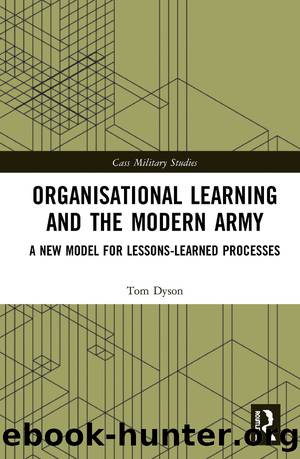Organisational Learning and the Modern Army by Tom Dyson

Author:Tom Dyson [Dyson, Tom]
Language: eng
Format: epub
Tags: History, Military, Strategy, Political Science, Political Freedom, Iraq War (2003-2011), Security (National & International)
ISBN: 9781000024050
Google: hTuhDwAAQBAJ
Publisher: Routledge
Published: 2019-07-08T01:36:33+00:00
Strategic culture and the civilâmilitary gap: a double-edged sword
A number of variables exogenous to the military have had an important influence on learning within the British armed forces. In particular, British strategic culture and the emergence of a civilâmilitary gap have combined to allow the armed forces a significant degree of freedom in activity at the tactical and operational levels. This freedom created a facilitative context for tactical level learning. Yet, as the remainder of the chapter demonstrates, the lack of civilian oversight of learning processes has allowed a number of variables endogenous to the military to exert a highly negative impact on the emergence of effective learning processes at the higher-tactical and operational levels.
A key feature of British strategic culture is the high level of professional status enjoyed by the military.1 Survey data collected in 2013 suggests consistently high levels of public support for the work of soldiers, trust in the armed forces and their professionalism (Hines et al. 2015, 695). This trust in the militaryâs professionalism is not, though, based upon a well-developed pubic understanding of the armed forces. Rather, a âcivilâmilitary gapâ, already in existence during the Cold War, has widened (Hines et al. 2015, 692â95). As Hines et al. (2015, 692) note, the civilâmilitary gap refers to âthe social distance that can arise between the Armed Forces and civilians from a lack of contact and shared experiences, and the implications for mutual understanding and supportâ.
Hines et al. (2015) point to a variety of factors driving the emergence of a civilâmilitary gap. First, the limited direct contact between military personnel and civilians following the 1963 abolition of national service (Hines et al. 2015, 692â95). Consequently, the number of politicians with direct experience and understanding of the military has fallen dramatically (Hines et al. 2015, 692; Strachan 2003, 46â47). Furthermore, the abolition of conscription saw the military develop a deeper sense of its professional expertise and distinctiveness from broader British society (Strachan 2003, 47â48). Hines et al. (2015, 692â93) and Strachan (2003, 47) also identify a shift of societal values away from those concurrent with military activity (self-sacrifice, obedience and loyalty to the Crown) toward a postmodern value set of autonomy and personal fulfilment.
The effect of the civilâmilitary gap on military autonomy at the tactical and operational levels has been exacerbated by the comparatively weak formal oversight powers of the British Parliament over defence policy (Dieterich et al. 2010, 69â71). Parliament has no formal legal powers to take part in decision-making on the use of force (Dieterich et al. 2010, 69â71; Mills 2015, 4â6). Since the 2003 decision to allow Parliament to vote on British participation in the Iraq War â and especially since the 2013 defeat of the coalition government over the deployment of British forces in Syria â a convention on the need for Parliamentary approval for the deployment of military force has been established (Mills 2015, 4â6). However, uncertainty persists about when the convention applies, potentially granting the core executive a high-degree of leeway to interpret its applicability (Mills 2015, 4â6).
Download
This site does not store any files on its server. We only index and link to content provided by other sites. Please contact the content providers to delete copyright contents if any and email us, we'll remove relevant links or contents immediately.
| Civil War | Operation Desert Storm |
| Veterans | Vietnam War |
The Radium Girls by Kate Moore(12012)
100 Deadly Skills by Clint Emerson(4911)
Rise and Kill First by Ronen Bergman(4775)
The Templars by Dan Jones(4679)
The Doomsday Machine by Daniel Ellsberg(4480)
The Rape of Nanking by Iris Chang(4194)
Killing England by Bill O'Reilly(3989)
Stalin by Stephen Kotkin(3955)
Hitler in Los Angeles by Steven J. Ross(3937)
12 Strong by Doug Stanton(3541)
Hitler's Monsters by Eric Kurlander(3327)
Blood and Sand by Alex Von Tunzelmann(3190)
The Code Book by Simon Singh(3172)
Darkest Hour by Anthony McCarten(3117)
The Art of War Visualized by Jessica Hagy(2996)
Hitler's Flying Saucers: A Guide to German Flying Discs of the Second World War by Stevens Henry(2744)
Babylon's Ark by Lawrence Anthony(2668)
The Second World Wars by Victor Davis Hanson(2520)
Tobruk by Peter Fitzsimons(2500)
